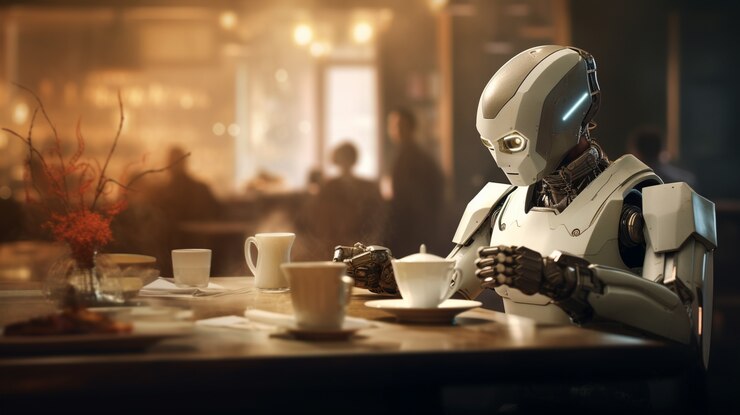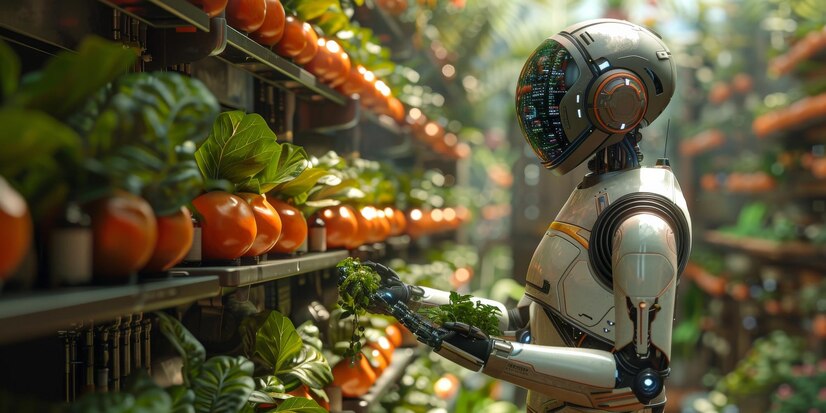Imagine walking into a restaurant, and instead of being greeted by a waiter, you’re welcomed by a robot with a ‘friendly smile’—Robots can not typically smile in the same way humans do, as they lack emotions and facial expressions. However, some robots are designed with physical features that allow them to ‘simulate’ a smile or use visual or sound effects that create an impression of kindness and friendliness. Shortly after, another robot brings you a menu on a screen and recommends the day’s specials, while yet another mechanical helper later delivers the food directly to your table. Just a few years ago, such scenes seemed like science fiction, but today they are increasingly becoming a reality…

How do robots work in restaurants?
Waiter robots can now be seen in restaurants around the world. Equipped with sensors, artificial intelligence, and specialized software, they can move, avoid obstacles, and interact with guests.
When a meal is prepared, robots like the famous Peanut in China take the plates from the kitchen, using advanced navigation systems to quickly and safely deliver the food to the guest’s table. After the meal, other robots discreetly approach and clean the tables, thoroughly disinfecting the surfaces. Hygiene is at an exceptional level, and the technology provides guests with a completely carefree and exciting experience, allowing them to fully enjoy it!

Advantages of Robots in Hospitality
Robots bring numerous advantages to the hospitality industry. They can work 24/7, without breaks, sick leave, or mood swings. Additionally, working with robots reduces a restaurant’s operational costs in the long term, as the need for many employees decreases. Moreover, robots have become a great attraction, drawing guests, especially in areas with high competition. Many restaurants use robots as a marketing tool, as people are eager to visit and experience a meal served by machines.
The Future of hospitality with Robots
In the future, we will likely see a combination of robots and humans working together in restaurants. Robots will be used for basic tasks, while humans will be responsible for guest communication, solving specific problems, and creating a welcoming atmosphere. We may also witness robots learning new skills and capabilities through artificial intelligence, becoming increasingly better suited to the jobs they perform.
However, as technology advances, it’s interesting to consider—will we one day reach a point where robots fully replace waitstaff? Perhaps the hospitality sector will become a new arena for collaboration between humans and machines, where robots will be valuable assistants but not complete replacements for people.
Although robots are increasingly being used, they are still not a full substitute for human staff. They lack the empathy, creativity, and flexibility in problem-solving that human waiters bring. Robots are intended as support staff to reduce the burden on people, especially for routine and repetitive tasks. Moreover, many studies show that guests appreciate the human interaction and kindness that the waitstaff provides during the dining experience. Robots may serve food, but they are unlikely to offer the warmth and personal touch that human workers bring.
Robots are result of our desire to improve everyday life and free people from monotonous tasks. However, when machines begin to mimic our creativity and empathy, we will face the question—”Will technological progress bring us closer together or distance us from what makes us human?”
As we wait to see what the future holds, we can enjoy this blend of technology and hospitality—because who knows, the next meal you eat might just be served by a robot.
Visionary – The voice of the future
Will robots ever be able to recognize the atmosphere in a restaurant and adapt their behavior accordingly? Empathy is key, and it’s hard to imagine a robot achieving that!
I completely agree, Miroslav! Recognizing the atmosphere and connecting with human emotions is what makes us special and sets us apart. Robots can do a lot, but warmth and understanding are still things that belong only to us, humans. 😊 Thank you for your comment.
Of course, no smile—no matter how unfriendly—can replace a robot. I definitely won’t be a guest/customer in places where robots are doing the tasks. 🥳
Haha… exactly, Mirjana! 😄 Human contact and the warmth of a smile are something that technology will never replace. But the fact is, the world is changing. That doesn’t necessarily mean we have to change too, right? Robots will at least make some tedious tasks easier, while we will continue to provide that genuine human touch… 😊 ❤️